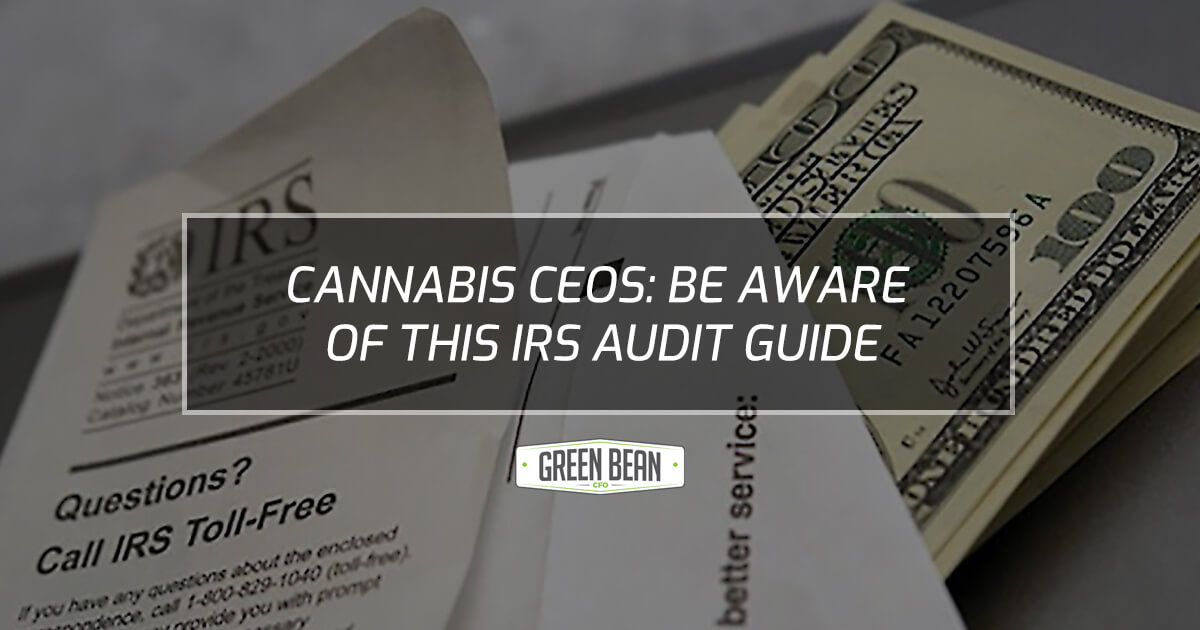Cannabis CEOs: Be Aware of this IRS Audit Guide

The IRS’s Cash Intensive Business Audit Techniques Guide (ATG)
Many cannabis touching businesses operating or having operated in the past on a cash (bags of money in hand) basis are not only more likely to be audited, but audits will be done in accordance with the IRS’s Cash Intensive Businesses Audit Technique Guide. You should peruse it on the IRS’s website:
Its intuitive that the IRS will want to see that your books are aligned with your income, but this exhaustive audit guide can lead to rabbit-holes that you don’t want to go down. We are only scratching the surface in this chapter; however, be wary of what you could be up against. IRS examiners may interview you, your family, and third parties. They’ll ask you to walk them through your business operations, internal controls, your other businesses, and if you have a hoard of cash, they’ll want to trace it to its source. They may tour your facility and might even ask you if you have a second safe in your home. They will investigate all your accounts; personal, business, investments, etc., Business ratios may be analyzed, and explanations may be sought for significant changes in, for example, profit margins, inventory turnover, etc.,
Let’s cover some highlights of the process outlined by the audit guide:
- The Audit Technique Guide (ATG) suggests the auditor take the following general course of action:
o Establish a likeliness of under-reported or unreported income
o Request an explanation of discrepancies from the taxpayer (you)
o If you can’t or won’t explain discrepancies, Financial Status Audit Techniques (FSAT) may be required
- An FSAT is an analysis to estimate whether your reported cash flow covers your expenses – both business and personal.
- If your books or records are missing, incomplete, or irregularities are identified, or if your FSAT shows a material imbalance in cash flows after consideration of adjustments identified during the exam, you are likely to be subjected to a more in-depth analysis
- If the IRS documents evidence that establishes the likelihood of unreported income, they may proceed to the “formal indirect method” to determine the actual tax liability. You don’t want to put yourself in a position where the IRS is calculating the tax you should have paid – this can lead to fines, penalties, a huge tax liability, the shutdown of your business, and possibly hard time in the joint! Never mind the effects on your family and your future.
What you should be thinking about NOW to be prepared for an audit:
- Simply stated, document, document, document. Maintain bullet-proof, accessible books and record. Identify and clean-up any past weaknesses.
- Hire competent cannabis accountants and lawyers who insist that everything is done in accordance with state and federal laws and IRS best practices.
- You want to be able to provide all relevant information directly to the IRS, so they are less likely to contact third parties; discrepancies among parties can lead to a deeper dive into your life.
- Consult with your lawyer/ CPA to have a game plan in place in the event of an audit. Heed this quote directly from the ATG:
o “Respect the taxpayer’s right to representation. Examiners cannot require that a taxpayer participate in the audit or be interviewed without a summons. However, examiners need to talk with a knowledgeable person. If needed, the taxpayer’s voluntary presence at an interview, or tour of the business site, can be requested through the representative.”
- Be familiar with some of the more obvious triggers of the formal indirect method:
From the IRS:
4.10.4.6.2.1 (05-27-2011)
When to Use a Formal Indirect Method
- The use of a formal indirect method to make the actual determination of tax liability should be considered when the factual development of the case leads the examiner to the conclusion that the taxpayer’s tax return and supporting books and records do not accurately reflect the total taxable income received and the examiner has established a reasonable likelihood of unreported income.
- The following list, which is not intended to be all inclusive, identifies circumstances that, individually or in combination, would support the use of a formal indirect method.
-
- A financial status analysis that cannot be balanced; i.e., the taxpayer’s known business and personal expenses exceed the reported income per the return and nontaxable sources of funds have not been identified to explain the difference.
- Irregularities in the taxpayer’s books and weak internal controls.
- Gross profit percentages change significantly from one year to another or are unusually high or low for that market segment or industry.
- The taxpayer’s bank accounts have unexplained items of deposit.
- The taxpayer does not make regular deposits of income but uses cash instead.
- A review of the taxpayer’s prior and subsequent year returns show a significant increase in net worth not supported by reported income.
- There are no books and records. Examiners should determine whether books and/or records ever existed, and whether books and records exist for the prior or subsequent years. If books and records have been destroyed, determine who destroyed them, why, and when.
- No method of accounting has been regularly used by the taxpayer or the method used does not clearly reflect income. See IRC 446(b).
Know what you are up against. Take a look at this ATG ASAP!
Also, keep in mind that the IRS has a long memory and the tools to dig deep and even use undercover agents to conduct investigations.
On September 17, 2018, a federal judge sentenced the owner of a Portland OR dispensary to seven months in federal prison for failing to file tax returns between 2011 and 2014. Click HERE to read that story.
Click HERE to find out if you cannabis accounting is a ticking time bomb!?
Author: Brian S. Whalen, CPA


